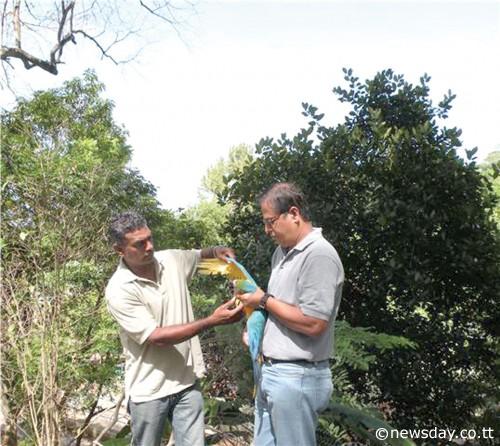 FLIGHT CLEARANCE: Final inspection by Richard Joseph, Zookeeper 111 and Nirmal Biptah, curator of the Emperor Valley Zoo.Conservation Advisor of the Zoological Society of Trinidad and Tobago, Nadra Nathai-Gyan has announced that six pairs of blue and gold macaws bred in captivity at the Emperor Valley Zoo are to be released in early July into the Nariva Swamp.
FLIGHT CLEARANCE: Final inspection by Richard Joseph, Zookeeper 111 and Nirmal Biptah, curator of the Emperor Valley Zoo.Conservation Advisor of the Zoological Society of Trinidad and Tobago, Nadra Nathai-Gyan has announced that six pairs of blue and gold macaws bred in captivity at the Emperor Valley Zoo are to be released in early July into the Nariva Swamp.
This initiative builds on the original re-introduction programme for this endangered species which took place over a period of time during 2001 to 2003.
At that time, the Cincinnati Zoo and Botanical Gardens had partnered with the Forestry Division, the Zoological Society, Manatee Conservation Trust and the community to release a total of 30 of these birds back into its native habitat at Nariva Swamp.
The blue and gold macaw had been part of the original biodiversity of Nariva Swamp but a combination of factors, including exploitation for the pet trade and habitat deterioration had brought this species to total annihilation since the 1960s.
This latest drive to enhance the current population level of the species is guided by the earlier events and will strictly conform to the scientific protocol for re-introduction as enunciated by the World Conservation Union. Wildlife Officer, David Boodoo who was an integral part of the original team assures that this protocol will yield continued success. He said, “The monitoring programme put in place for these 30 released birds has shown that the population has grown to 68 in the latter part of 2008, with young birds observed throughout the area.”
It is in the spirit of its environmental responsibility and the knowledge that the expertise in re-introduction of the birds now exists locally that the Zoological Society felt driven to re-vitalise this initiative that was at a standstill since 2003.
Team members participating in this undertaking come from the Society itself, the Manatee Conservation Trust and community members under the guidance of the Wildlife Section, Forestry Division.
Lisa Ramkissoon-Maharaj, President of the Manatee Conservation Trust has indicated that the birds, having undergone the quarantine requirements at the zoo, were already removed to the locally sited flight cage, where they are becoming acclimatised to their new environment.
Their care takers are all experienced in this first phase and are present round-the-clock to tend to their needs and provide security. The second phase which involves the actual re-introduction into the wild habitat will follow after a period of seven days elapses. To address concerns raised as to the capacity of the Nariva Swamp to support an increased population of blue and gold macaws, wildlife officials have confirmed that the habitat has shown considerable improvement and will be able to meet the feeding and nesting requirements of these birds.
The Zoological Society has stated that it is committed to the long-term success of this re-introduction project and will be involved thereafter in the monitoring programme. Gupte Lutchmedial, President of the Zoological Society said: “Our role continues after the release and it is crucial to monitor the birds on a daily basis with the assistance of the community.” He continued, “The lessons we learn from this exercise will guide future events and ensure that projects to follow, whether at Nariva or other locations, will be successful.” This latter statement was made in the context of the policy of the Zoological Society to make excess indigenous animals bred in captivity available for release into the wild.
Conservationists, who have long lamented the demise of this species from the Nariva Swamp, and indeed the threat posed to wildlife in general, should be hopeful that this initiative by a group of environmental non-governmental agencies, supported by the state agency would spur others into becoming part of the stewardship of this country’s rich natural heritage.